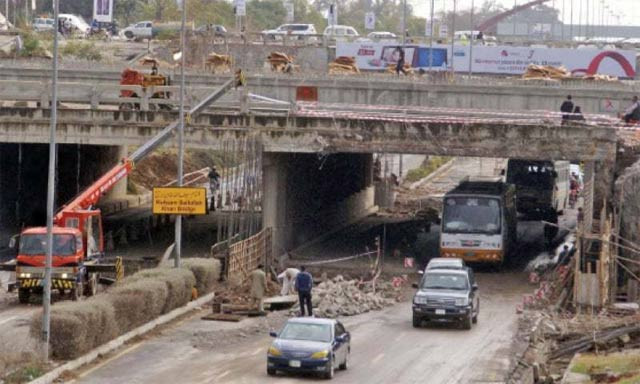Accords for $435m ADB loan signed
The amount is meant to support efforts for advanced transport infrastructure in K-P, Sindh

PHOTO: INP
The signing of the loan documents would remove irritants in completing other procedural formalities for the construction of a Bus Rapid Transport (BRT) system in Khyber-Pakhtunkhwa and making policies for the participation of private sector in infrastructure projects in Sindh.
Pakistan, ADB sign $325m loan deal for clean power supply
The ADB has approved a $335 million loan to help develop the BRT system in Peshawar. The Manila-based lending agency also gave $100 million for the Public Private Partnership Investment programme in Sindh.
ADB’s Country Director for Pakistan Xiaohong Yang and Economic Affairs Division (EAD) Secretary Shahid Mahmood signed both the loan agreements in Islamabad. Finance Minister Ishaq Dar witnessed the signing ceremony.
“Peshawar’s booming population has been causing tremendous traffic congestion and pressure on its public transport infrastructure and basic urban services, negatively impacting its economic growth,” said Miss Yang after the signing ceremony.
Pakistan, ADB to ink $250m loan next week
“The BRT corridor will improve the quality of life of the city’s residents by offering safer, efficient, and affordable public transportation. The modern technology used in the project will also cut emissions, and make commuting easier and safer for women, besides attracting businesses and investors to the city,” she added.
The Agence Française de Développement (AFD) and the European Investment Bank are also expected to co-finance the project. Each institution could provide $75 million. The total cost of the project is $587 million.
The Peshawar BRT corridor will span 26 kilometres from Chamkani to Hayatabad, mainly at-grade along the GT Road with a 6km elevated section in the city centre and tunnel or trench section at junctions to ensure its full segregation. The system will include 32 stations, one staging facility and two depots.
The entire corridor will be restructured along the new BRT infrastructure, including upgraded mixed traffic lanes, sidewalks, streetlights and drainage. It will have many innovative features such as park-and-ride facilities, and a continuous walkway and bicycle lanes built along the at-grade sections and underneath the elevated section.
Pakistan signs deal for Italian choppers
Bicycle parking will also be provided on pilot basis at BRT stations to allow commuters to use bicycles as their first or last mile connectivity to the BRT. The Peshawar BRT project is a transformational venture for the city that will lead to urban renewal on a wide scale.
The BRT project will also help develop institutional capacity of the Khyber Pakhtunkhwa Mobility Authority and the Trans-Peshawar Company to ensure sustainable operations. It will establish universal access and safety features for women and children, as well as disabled, including proper lighting and surveillance, segregated areas, and staff trained to facilitate women commuters.
Of the 4,000 jobs expected to be generated by the project, over 20% are expected to be for women.
Sindh project
The ADB would also give $100 million for improving and strengthening standards in development and delivery of the Public-Private Partnership (PPP) projects to increase investment in infrastructure and services in Sindh.
Besides infrastructure, Pakistan must also seek capital for export industries
The project will help establish a PPP Support Facility (PSF), a not-for-profit company with the private sector-led management to manage the government’s support for the PPPs in a fiscally responsible manner.
The support will be mainly provided to the PPPs through a viability gap funding for mobilising private sector investments in infrastructure, including social services.
The project will help strengthen the Sindh government’s capacity to identify, develop and implement projects with the private sector participation, bringing innovation, efficiency and overall value-for-money.
The government of the United Kingdom through the Department for International Development (DFID) is co-financing the project through a $19.23 million technical assistance, which will be administered by the ADB.
The total cost of the project is $188.98 million, with the Sindh government contributing $65 million. The expected completion date of the project is mid-2022.



















COMMENTS
Comments are moderated and generally will be posted if they are on-topic and not abusive.
For more information, please see our Comments FAQ